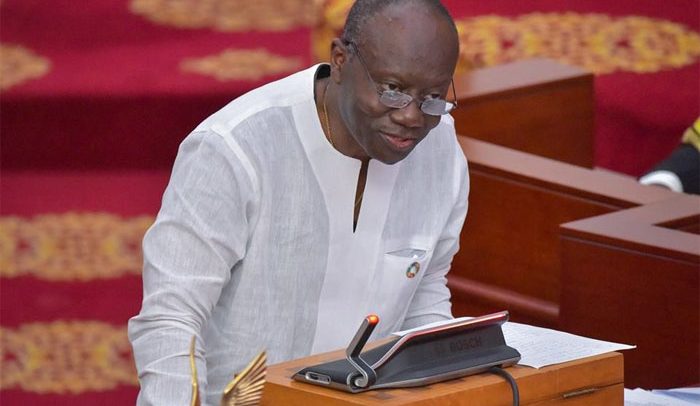Critical Fall Outs from Mid-Year Budget

During the 2020 Mid-Year Budget review, the Finance Minister Hon. Ken Ofori-Atta spoke extensively on issues bordering the economy, agric and industry.
He indicated the performance of the economy in the first quarter of 2020,. The real GDP growth rate of 6.8 percent was recorded. The non-Oil Real GDP growth rate was 6.7 percent, The End-period Inflation rate stood at 8.0 percent and the overall fiscal deficit was 4.7 percent of GDP.
Primary surplus of 0.7 percent of GDP; and, Gross international reserves to cover at least 3.5 months of imports of goods and services.
READ: Govt spends GH¢6bn more in Q1 to fight coronavirus
He also revealed that “The Agriculture Sector recorded a growth of 2.8 percent in the first quarter of 2020 compared to 2.2 percent during the same period in 2019.
Industry Sector recorded a growth of 1.5 percent in the first quarter of 2020 compared to 8.4 percent during the same period in 2019.
Growth in the Services Sector was strong at 9.5 percent in the first quarter of 2020 compared to 7.2 percent recorded during the same period in 2019.”
On Railway Development the Finance Minister said
“We set out to modernize the railway system and effectively replace the colonial rail layout. Since 2017, we have committed GH¢ 566.66 million to cover works on 24 construction and rehabilitation of railway lines including rehabilitation of Accra to Tema (30km), Achimota to Nsawam (33 km) and Kojokrom to Tarkwa (56km).
The Tema to Mpakadan railway line has seen approximately 56km out of the 97km of track laying works completed. The construction of the new standard gauge Western Line (Takoradi to Kumasi), with the Kojokrom to Manso section, is also on course”
COIV-19: updated fiscal estimates indicate that revenues are expected to fall short of the 2020 Budget target by GH¢13,632 million (3.5% of revised GDP) arising from shortfalls in Petroleum Receipts of GH¢5,257 million; Non-Oil Tax revenue GH¢5,089 million; and NonTax Revenues of GH¢3,286 million.”
expenditures, on the other hand, are expected to increase by GH¢11,660 million (3.4% of revised GDP), reflecting mainly expenditures on COVID-19 Preparedness & Response Plan, provision of Health Infrastructure (Agenda 88+), Coronavirus Alleviation Programme, Capitalisation of National Development Bank, Security, Elections, and payment of outstanding claims.
In his statement during the 2020 Mid-Year Budget, he said: “Mr. Speaker, at the beginning of the year, Government did not anticipate the need to provide over 300,000 COVID-19 test kits, extra allowance to frontline health workers, income tax exemption for all health sector workers, hire over 1,000 contact tracers, supply households with free water, free electricity for over 50 percent of the population and provide GH¢600 million to support small and medium scale enterprises under the Coronavirus Alleviation Programme.”
He added that “all these costs to Government come at a time of reduced revenue at our ports, fall in global oil prices, near collapse of the hospitality industry and a general decline in global trade. Such unexpected expenditure often leads to increased budget deficits. However, it should be noted that these are not ordinary times and as such, require extraordinary economic and financial interventions,”.
On the efforts of the Government to alleviate the impact of the COVID-19, he posited that Ghanaians will enjoy another three months of free water and electricity supply as the government further reduces the burden of the Covid-19 pandemic on the citizenry.
The Finance Minister Ken Ofori-Atta who announced this during his Mid-year Budget review said it is because the government puts the concerns and aspirations of the ordinary Ghanaian first.
“That is also why we further reduced electricity prices by half and completely provided potable water for free for everybody since March this year. And we will extend it for another three months,” he told Parliament, Thursday.
According to the Minister of Finance, Hon. Kenn Ofori-Atta, all these costs to Government come at a time of reduced revenue at our ports, fall in global oil prices, near collapse of the hospitality industry and a general decline in global trade. Such unexpected expenditure often leads to increased budget deficits. However, it should be noted that these are not ordinary times and as such, require extraordinary economic and financial interventions.
 Cedi deeps $1 sells for GHS14.10 : Exchange rates for today out
Cedi deeps $1 sells for GHS14.10 : Exchange rates for today out  SSNIT will not be able to pay pensions 12 years from now
SSNIT will not be able to pay pensions 12 years from now  All Exchange Rates For Today As Dollar to Cedi Rate Crosses GHS14.00
All Exchange Rates For Today As Dollar to Cedi Rate Crosses GHS14.00  $1 now sells at GH¢14.00 as cedi depreciates 12.08%
$1 now sells at GH¢14.00 as cedi depreciates 12.08%  Cedi Depreciation Fights Back: Drops Just 6.2% in Early 2024
Cedi Depreciation Fights Back: Drops Just 6.2% in Early 2024  Ghana’s export earnings stagnate at $2.8bn as contribution of cocoa drops by $200m
Ghana’s export earnings stagnate at $2.8bn as contribution of cocoa drops by $200m  SSNIT debunks the Depletion of its reserves
SSNIT debunks the Depletion of its reserves  Stephen Appiah Set to Contest in Upcoming MP Elections
Stephen Appiah Set to Contest in Upcoming MP Elections  Liverpool agree Arne Slot deal with Feyenoord
Liverpool agree Arne Slot deal with Feyenoord  Arsenal Open Talks with Gabriel After Strong 2023/24
Arsenal Open Talks with Gabriel After Strong 2023/24